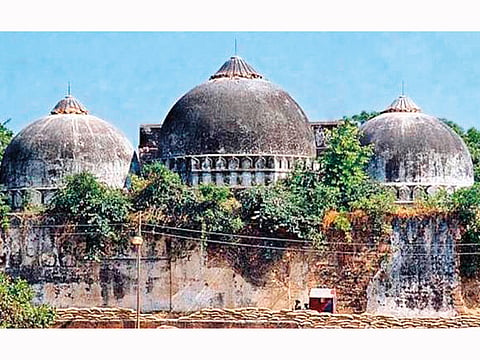Indian minister and ruling party veterans face revived trial for 1992 mosque attack
Demolition of the Babri mosque in the northern town of Ayodhya in 1992 triggered one of the most explosive religious riots in Indian history

New Delhi: In a major setback for India’s ruling Bharatiya Janata Party (BJP), the country’s top court on Wednesday restored criminal conspiracy charges against four of its senior leaders, including a minister in Prime Minister Narendra Modi’s cabinet, for their alleged role in the 1992 demolition of a historic mosque by a Hindu mob.
The demolition of the Babri mosque, in the northern town of Ayodhya, triggered one of the most explosive religious riots in Indian history, which killed thousands, deepening divisions between Hindus and Muslims.
The court said Uma Bharti, India’s water resources minister, and BJP veterans LK Advani and Murli Manohar Joshi, should face trial on criminal conspiracy charges for making inflammatory speeches that incited Hindus to tear down the 16th century mosque.
The court also ruled that a fourth senior BJP politician, Kalyan Singh, who was chief minister of Uttar Pradesh at the time of the incident, should face similar charges. But his trial will be delayed until his stint as governor of the western Rajasthan state has been completed because the position gives him immunity from prosecution.
Noting that the matter was pending for the last 25 years, a Supreme Court Bench comprising Justice Pinaki Chandra Ghose and Justice Rohinton Fali Nariman said they had invoked extraordinary powers under the Indian Constitution’s Article 142 to transfer the trial to the northern city of Lucknow, where BJP leaders would be tried.
The ruling came after a lower court — the Allahabad High Court — dropped the charges brought against the BJP leaders by India’s Central Bureau of Investigation (CBI), kicking off a series of appeals and counter-appeals. “
We have allowed the CBI appeal against the Allahabad High Court judgement with certain directions,” the judges said. The court ordered two separate ongoing trials in the matter to be clubbed and conducted in Lucknow only, and said the cases must be completed in two years.
The charges against the BJP leaders date back more than a decade.
According to the CBI, Advani, 89, and other BJP leaders had hatched a conspiracy to demolish the mosque on December 6, 1992.
It also alleged that the leaders secretly met at the residence of the right-wing Vishwa Hindu Parishad (VHP) leader Vinay Katiyar the night before the demolition, during which a final decision was taken.
Hours after the order was passed, Bharti said she was “ready to hang” for the temple cause and would travel to Ayodhya later on Wednesday.
“Yes, I was there in Ayodhya on December 6, [1992] … The rest of the matter is for lawyers to talk in the court. Let me be hanged or jailed, I have no problem, I only want to see a Ram temple there. I have never expressed regret. I am proud of what I did there. There absolutely are no regrets,” she said. Katiyar said there was no need for Bharti to resign from the Modi cabinet in the wake of the court ruling.
“The charges against LK Advani, MM Joshi and Uma Bharti are baseless … We want Ram temple to be built soon. It is our wish which will be fulfilled soon,” he said.
The ruling BJP’s spokesperson GVL Narasimha Rao was more cautious. “We have not received the court order yet. We shall study it and see what it says about LK Advani, Uma Bharti, MM Joshi and others. Till that time, we cannot say anything on this matter,” he said.
In 1992, Advani, a former home minister and then chief of the BJP, led Hindus on a pilgrimage that ended with the razing of the mosque in Ayodhya, 550km east of Indian capital New Delhi. Photographs circulated at the time show politicians celebrating its destruction.
Advani has consistently denied a criminal conspiracy to destroy the mosque. In a later interview with the BBC, he said the mosque should never have been razed and described it as the saddest day of his life. Advani was tipped to be India’s president when the role becomes vacant later this year, but the revival of the charges could scupper his chances.
Hardliners' calls
Calls from hardliners for the immediate construction of the temple have challenged Modi as he tries to balance the demands of Hindu activists emboldened by his victory in 2014 with an economic reform agenda supported by a broader swathe of the electorate.
Most BJP politicians have said the courts should decide if construction can go ahead.
The opposition Congress party said the BJP had “tried every trick in the book” to ensure that Advani, Bharti and Joshi did not face charges.
“What they [the Supreme Court] have said today means there’s clinching evidence that needs to be now argued out in the court,” said party spokesman Sanjay Jha.
Some legal experts also expressed fears the case would drag on much longer than the two years as directed by the court. “There are hundreds of witnesses in the case and now all of them will have to be re-examined,” said IB Singh, a senior lawyer who cross-examined Advani for the official inquiry into the Babri demolition.
“I doubt if this will anyway get over within the lifetime of Mr Advani.”
Sign up for the Daily Briefing
Get the latest news and updates straight to your inbox

